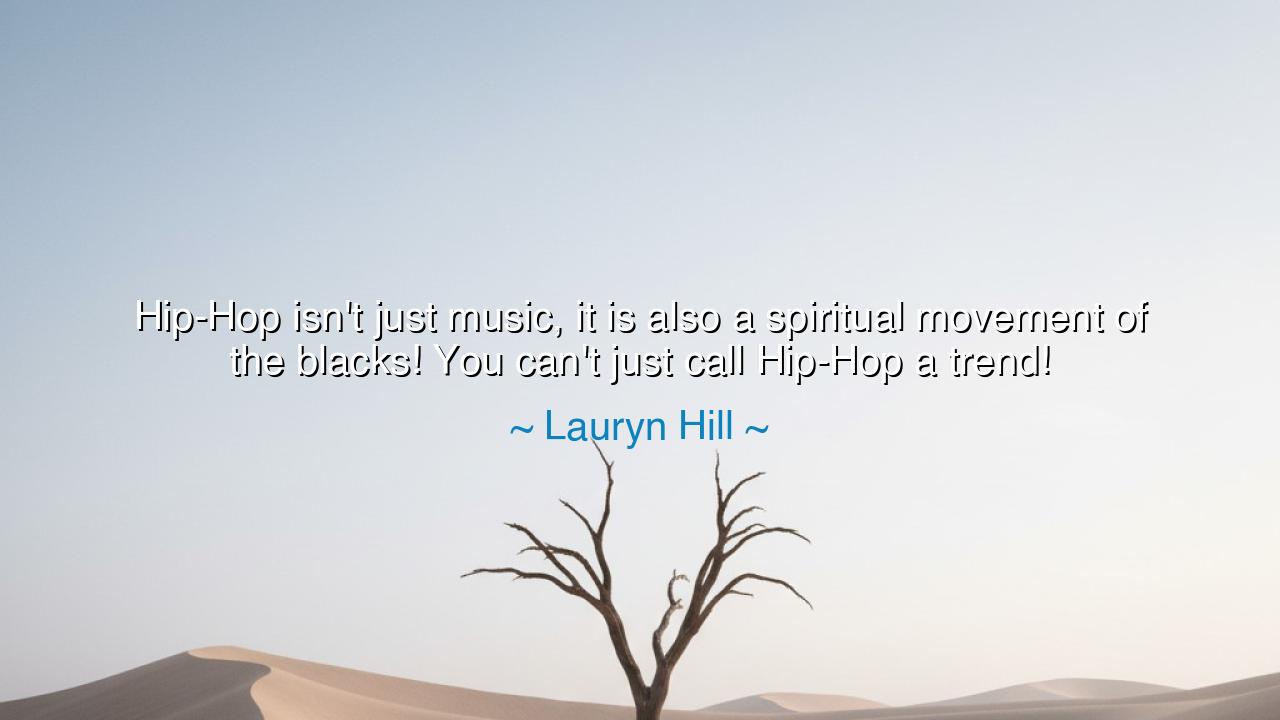
Hip-Hop isn't just music, it is also a spiritual movement of the
Hip-Hop isn't just music, it is also a spiritual movement of the blacks! You can't just call Hip-Hop a trend!






Hear the fiery words of Lauryn Hill, prophetess of song and voice of a people, who declared: “Hip-Hop isn’t just music, it is also a spiritual movement of the blacks! You can’t just call Hip-Hop a trend!” In this cry she defends not only an artform, but a sacred inheritance. For too long the world sought to reduce Hip-Hop to fashion, noise, or passing style. Yet Hill proclaims it as more: a vessel of memory, a cry of resistance, a holy rhythm born of suffering and hope. It is not a mere diversion, but a living scripture of the streets.
The ancients too bore witness to the power of rhythm as a form of survival. Among the enslaved in the Americas, when chains bound their bodies, it was the drum, the chant, the hidden code of song that kept their spirits alive. Music was their prayer and their weapon, their communion and their history. Out of gospel, blues, and jazz came voices that would one day birth Hip-Hop—a continuation of this unbroken spiritual lineage. Lauryn Hill’s words remind us that to dismiss it as a trend is to erase the centuries of endurance from which it sprang.
Consider the story of the Bronx in the 1970s. Amidst poverty, neglect, and violence, young voices rose, armed not with weapons but with turntables, breakbeats, and words. They transformed ruins into stages, despair into expression. Graffiti, DJing, MCing, and breakdancing—these were not mere entertainments, but declarations: We exist. We resist. We are more than the chains placed upon us. From that soil grew a spiritual movement, not ordained in temples, but consecrated in block parties and battles.
Lauryn Hill herself embodied this truth. With her voice, both tender and fierce, she carried the wisdom of soul, reggae, gospel, and Hip-Hop, weaving them into hymns of identity and liberation. In her vision, Hip-Hop was not about chasing fame, but about carrying forward the ancestral voice. Just as griots in Africa preserved history through word and rhythm, so do MCs in Hip-Hop preserve the struggles and triumphs of black existence. It is this lineage that makes it sacred, not fleeting.
The teaching is clear: Hip-Hop is not to be consumed lightly, like fashion that fades with the season. It is a mirror of a people, a book written not with ink but with beat and breath. To reduce it to a trend is to insult the ancestors who sang in the fields, the activists who marched in the streets, and the youth who carved joy out of hardship. True listeners must approach it as one approaches scripture—ready to hear truth, to be moved, to be changed.
History itself affirms this. Think of the spirituals sung in the plantations, coded with messages of freedom. Think of the blues that carried sorrow yet birthed strength. Each generation of black expression has been labeled at first as crude or dangerous, only to be recognized later as profound. So it is with Hip-Hop—called a menace by its critics, but in truth a spiritual movement that gave voice to the voiceless. Lauryn Hill’s words are not exaggeration, but testimony.
Practical wisdom follows: listen to Hip-Hop not only with your ears, but with your soul. Seek the truth hidden in its rhymes, the prayer beneath its rhythms. Honor it as a cultural inheritance, not a disposable trend. And if you create, create with respect—for every beat carries history, every lyric carries the weight of those who walked before. To dismiss it is to close your ears to the cries and the wisdom of an entire people.
So let Lauryn Hill’s words be remembered as law: “Hip-Hop isn’t just music—it is a spiritual movement.” Honor it as such, and you will see not only the art, but the spirit behind it. Treat it as a trend, and you blind yourself to its power. For Hip-Hop is the voice of resilience, the rhythm of survival, and the song of freedom—a sacred fire passed down through the ages, burning still in the hearts of those who dare to speak their truth.






AAdministratorAdministrator
Welcome, honored guests. Please leave a comment, we will respond soon